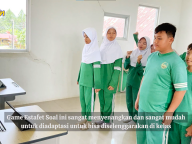
In Indonesia and Southeast Asia, millions of children still don’t have equal access to education. Many of them live in rural, hard-to-reach areas where their families struggle with poverty. These parents often don’t have the means or platform to speak up about their children’s needs, so their voices go unheard. In these areas, internet access is also limited because telecom companies have little incentive to invest in remote regions with fewer people and low income, leaving these communities without digital access for years.
For children in these underserved areas, local schools are often the only place they can learn, since school is free. But these schools face serious challenges: there aren’t enough qualified teachers, and those who are there may lack proper training. Many students are left without the support they need to succeed. At first glance, this seems like a problem only governments can fix, and people often think a startup couldn’t make a difference in such difficult conditions.
Most startups are focused on making money fast, and many fail because their founders lose interest when profits don’t appear quickly. But at Kipin, we took a different approach. Our main motivation wasn’t immediate profits—it was helping students who would otherwise be left behind. This purpose kept us going for nearly eight years before we saw any real revenue. But our commitment to the mission gave us the strength to keep building. Today, that mission has attracted strong support from local government and dunia organizations, allowing us to bring our vision to life.
 Kipin Become the Best Winner of Temasek Foundation Education Challenge 2024
Kipin Become the Best Winner of Temasek Foundation Education Challenge 2024Recently, Kipin was recognized as the Indonesian winner at the Temasek Foundation Education Challenge during the EduTech Asia event and co-organized by EdTech accelerator EduSpaze. This event highlights innovative technologies that can solve major education challenges across Southeast Asia. Our HYBRID online-offline learning solution known as eduSPOT, won praise for its unique approach to helping schools. With Kipin’s Smart Classroom device, students and teachers can access ten of thousands of books, videos, practice tests, and educational comics without needing the internet at all. The device stores content locally and only needs an internet connection once a month for optional updates. Teachers can take it to a bigger city, connect to the internet, get the latest updates, and then return to their offline school with all the new latest materials.
Kipin eduSPOT’s hybrid technology is truly unique and impressive, delivering an online-like experience for both teachers and students—even in offline environments. Students simply connect to the Kipin eduSPOT Wi-Fi with their devices—smartphones, tablets, or laptops—and gain seamless access to all content as if they were online. Kipin’s hybrid technology allows it to work both online and offline, ensuring smooth learning experiences no matter the connectivity situation.
In just two years, more than 3,000 schools have adopted Kipin Smart Classroom technology. Teachers now use it every day, making their jobs easier and improving their digital skills, while students gain free access to digital resources that were previously out of reach. Our journey shows that startups can make a real difference by supporting access to education for disadvantaged students—and that doing so can also lead to business success.
Helping underserved communities has taught us the importance of staying focused on real needs, staying humble, and using our resources wisely. Instead of wasting money on unnecessary expenses, we put it toward building a solid, sustainable business model. By staying true to our purpose, we built a lean, effective business that has helped us grow and make an impact in the areas that need it most.
More Information:
Email : [email protected]
Chat : http://wa.me/6281233601047
Web : http://kipin.id

 1 bulan yang lalu
1 bulan yang lalu








 English (US) ·
English (US) ·  Indonesian (ID) ·
Indonesian (ID) ·